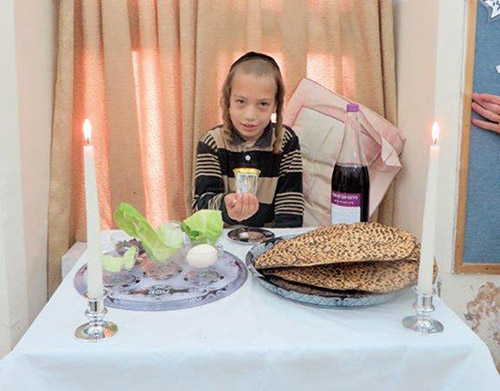
Pesach night—or shall we say nights—is challenging enough as it is for mothers, who have spent the greater part of the last week/month (at least!) scrubbing down every nook and cranny of their house for chametz. Then it’s erev Pesach, biur chametz, preparing the matzah and marror, setting the table, making sure there’s enough wine or grape juice for all the guests…we can go on and on. But for children with special needs, many of whom have trouble sitting still and respecting orderly boundaries, the Pesach seder becomes even more difficult.
We asked Doreen Winter, MSW, social worker at Seeach Sod, for tips on how to make seder night as calm and relaxed as possible when a child with special needs is in the family.
Make a special Haggadah. For a child who can’t really comprehend every detail going on during the seder, Ms. Winter suggests making a personalized Haggadah especially for them. “It should have no words: just colorful pictures, and it should be interactive. You could create some pictures and Velcro them to the pages. Ask your child, Where is the matzah? so they could take out the matzah from the Haggadah and show it to you.”
Dramatize the Exodus. “With your other children, act out parts of the Haggadah with puppets, or like a dramatic play. This makes it more interesting and entertaining for your child with special needs, who may otherwise not understand what’s really going on during the seder.”
Cook their favorite food. “Make the special food your child loves. He or she (like your other children, I assume) should not have to wait like everyone else to eat dinner—Shulchan Orech comes way after regular dinnertime.”
Let them sleep. “When your special-needs child gets tired, worked up or upset, she can go to sleep. Don’t force her to stay up and participate, even if he or she is an older adult.”
Plan ahead. If your child or older adult is unable to act appropriately, and may lessen the overall experience of the seder, you have to make a choice, says Ms. Winter: “You can make a short seder just for her, on a different night before Pesach, so that you won’t feel the need to have her participate in the actual seder night because she has already experienced it beforehand. Or you can have her participate in the actual seder even if she may disrupt the seder at various points and annoy your other children, who will probably want your dedicated attention. Though this is a difficult choice, your entire life with a special-needs child requires sacrifices and choices to be made—none of which are easy.”
Give them a goodie bag. “Your special child should have a goodie bag that is just his or hers, and can eat from it throughout the seder when he feels the need. Remember that matza and marror doesn’t taste good to everyone, least of all to sensory-sensitive children.”
Set boundaries. It’s okay to set limits. Even with older adults, it’s okay to tell them “You are not behaving, so you must leave the room.” I believe limits are like hugs: They teach the child that you care about them and that they have self-respect.”
Have a good attitude. Remind yourself to stay positive. “At the end of the day,” says Ms. Winter, “you want to be able to tell yourself: ‘I am doing the best I can with what Hashem gave me.’ It is ok not to be perfect constantly. It’s okay to realize that you can’t meet everyone’s needs at the same time. Sometimes your special-needs child will come first, and sometimes your other children will come first. And sometimes you will come first. To have a happy home, Mom has to be happy.”
With these tips in mind, you’re sure to have a Chag Kasher v’Sameach!
Doreen Winter, MSW, is a social worker at Seeach Sod, one of Israel’s leading rehabilitative and educational centers for special needs and physically challenged children and adults. Based in Jerusalem, Israel, Seeach Sod offers a multitude of services and programs to enhance the quality of life of individuals with special needs as well as their parents and family members.
By Yael Klein












